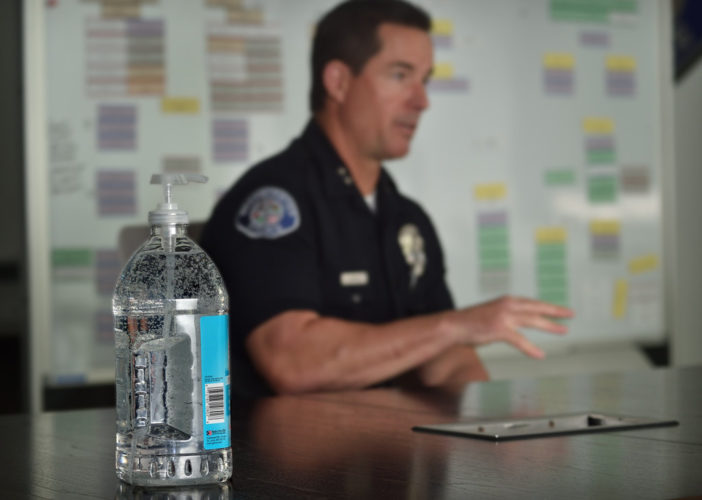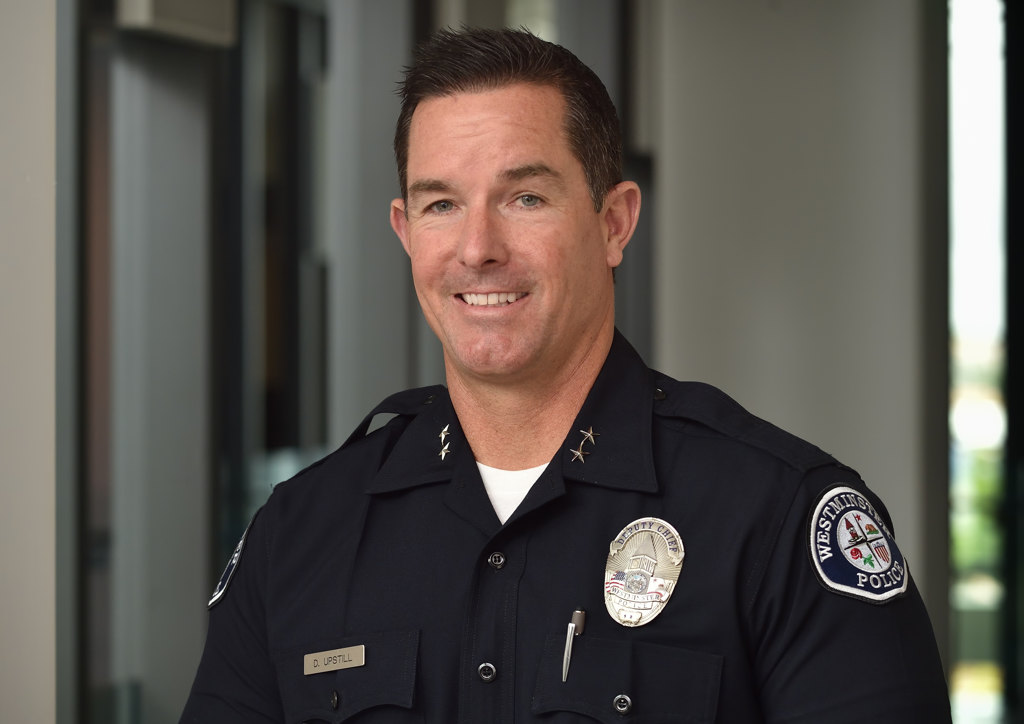Deputy Chief Darin Upstill walked into the conference room at the Westminster PD and plopped down a 66.7-ounce bottle of Germ-X hand sanitizer on the pristine wood table.
Sitting several feet away from two visitors across the table, he pumped the bottle and slathered a generous amount of sanitizer on his hands.
His guests then did the same.
Welcome to the new normal at the WPD and other police agencies in Orange County.
Since mid-March, law enforcement agencies have enacted several changes in how to best protect their officers while still protecting the communities they serve.
Upstill met with Behind the Badge on Monday, April 6, to talk about all of the changes the WPD command staff has enacted since the coronavirus pandemic erupted, killing 14 people and infecting a total of 882 in Orange County as of Tuesday afternoon, April 7.
Statewide, the toll is 430 deaths and 17,165 confirmed cases as of Tuesday afternoon – numbers that continue to rise. The novel coronavirus causes COVID-19, which can be deadly.
“The first thing we thought of was what can we do right now to get ahead of (the pandemic),” Upstill said of a WPD command staff meeting on Wednesday, March 11 — the day the World Health Organization declared the novel coronavirus a global pandemic.
“Our first priority was the safety of our employees,” said Upstill, who was promoted to deputy chief on March 14. “We asked ourselves, ‘What can we do to make it better for employees while at the same understanding we have an obligation to protect the public?’”
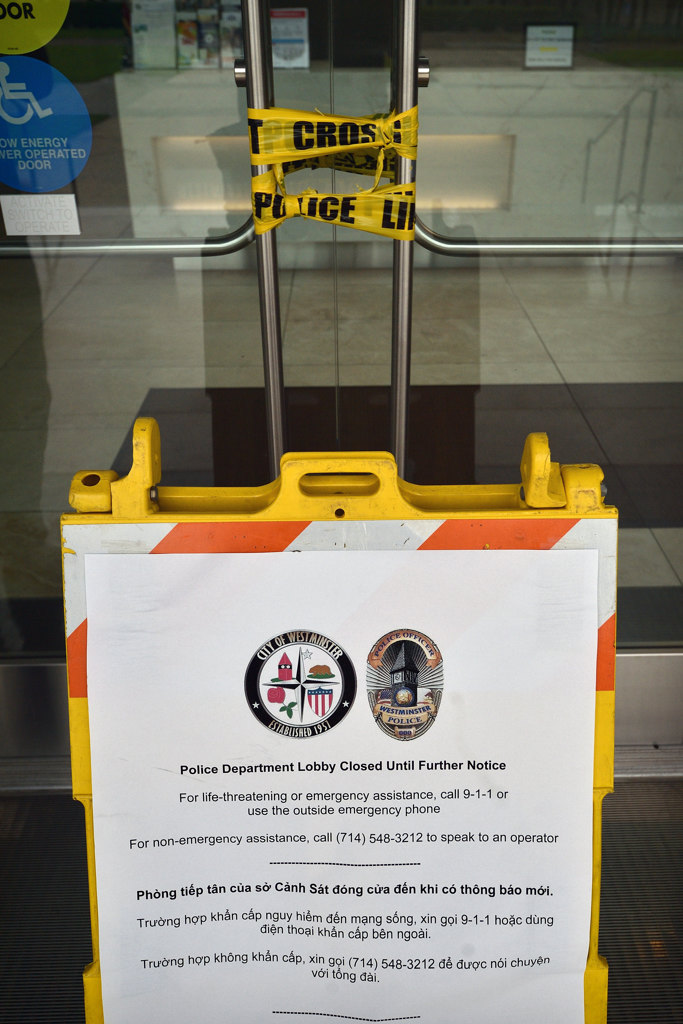
A sign at the entrance of the Westminster Police Department informs people that the lobby is closed until further notice.
Photo by Steven Georges/Behind the Badge
On March 11, the WPD closed its lobby to the public, limiting non-emergency police business to computers or phone lines.
A sign at the entrance to the WPD — in English, Spanish, and Vietnamese — lists a non-emergency line for people to call as well as a reminder for them to call 911 for life-threatening or emergency assistance.
The lobby door handles remain festooned with yellow crime scene tape.
The WPD has about 130 total employees – 90 of them sworn officers.
An immediate concern was front-line patrol officers, Upstill said.
One of the first changes the WPD made was forming four platoon shifts for patrol officers. Now, officers only work with the same partners to avoid cross-contaminating other officers. Prior to the change, they could work with a variety of partners during their shifts.
If officers have to go inside houses on calls, they must wear masks. If they respond to deaths in homes, they wear a mask, gloves, and protective eye ware, and they have the option of donning a gown-type plastic covering.
Also now, only half of WPD officers on any given shift are allowed in the locker room at the same time. When they are done cleaning up and getting dressed, the other officers go in.
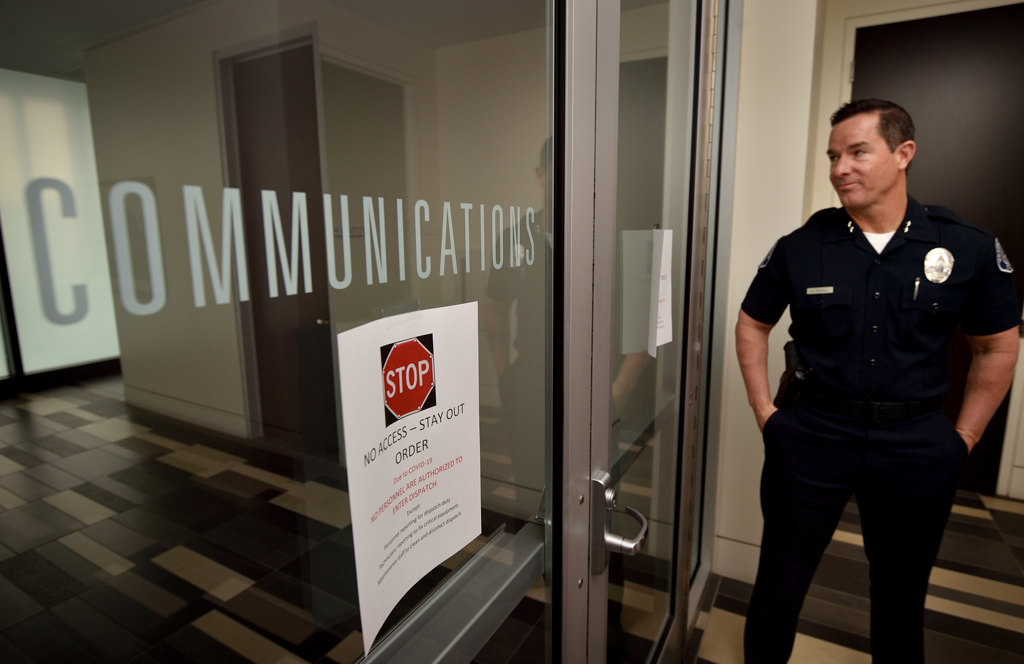
One of the many steps the Westminster PD has taken is blocking access to the dispatch department to all but essential personnel.
Photo by Steven Georges/Behind the Badge
Effective this week, a cleaning company has been hired to decontaminate the interiors of patrol cars daily, Upstill said. WPD officers reporting to work now only use cars with a green placard on the dashboard, indicating they have been decontaminated. Cars with a red placard still need to be cleaned.
Another change instituted in mid-March, was having WPD officers roll out only to priority-one calls, such as crimes in progress or traffic accidents involving injuries.
Officers are taking more report calls over the phone to decrease exposure to the public and themselves.
And when officers do make a car stop and an arrest, in addition to slapping handcuffs on a suspect, they put a mask on suspects to avoid becoming exposed to droplets from coughs or sneezes.
“We still want our officers to be out and visible to the public, which is huge especially during these times,” Upstill said. “It creates a sense of stability and security that people can see.”
In a big change, the WPD Communication Unit – where dispatchers work – pretty much have been sealed off from all other personnel, unless there is an emergency. Previously, officers and other WPD staff members would routinely walk into the dispatch center to conduct business.
“No one’s allowed in dispatch unless it’s absolutely necessary,” Upstill said. “Anything that can be handled over the phone now is handled over the phone.”
WPD dispatchers also are working platoon shifts, he added.
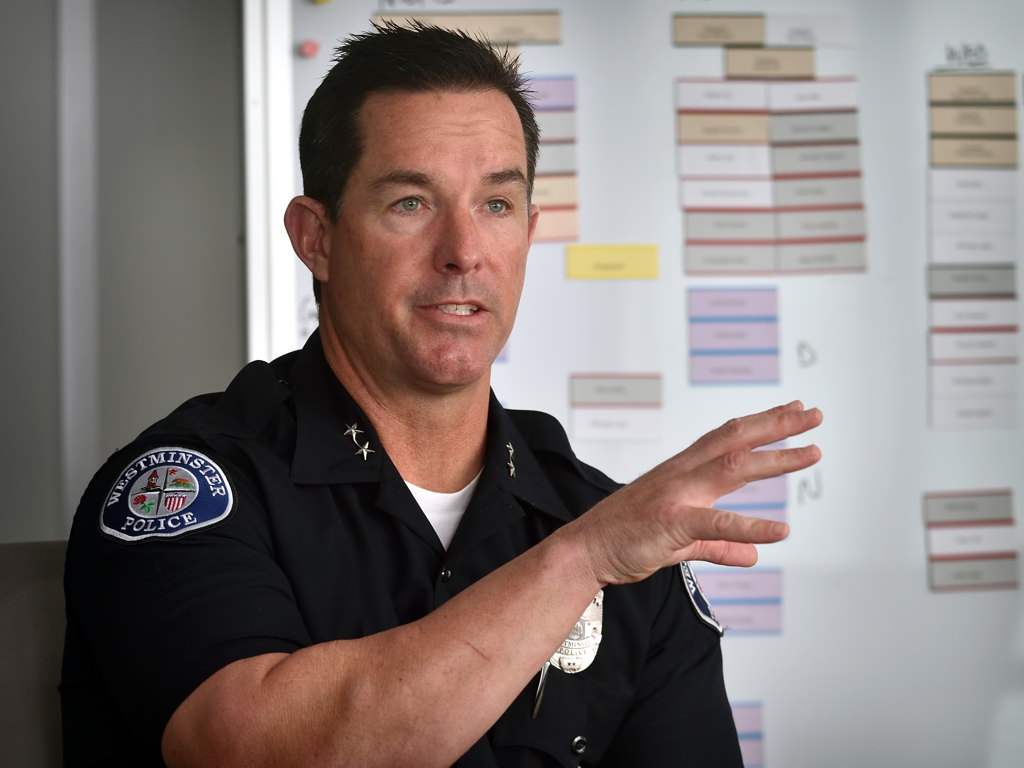
Westminster PD Deputy Chief Darin Upstill talks about how the police department is dealing with the COVID-19 pandemic.
Photo by Steven Georges/Behind the Badge
WPD personnel also are restricted from going into the agency’s detective bureau. And the WPD’s 12 detectives are ready to shift to patrol or dispatch (those who have experience in the unit or who have been trained) should the need arise.
Since mid-March, Westminster’s crime rate is down 10 percent in overall priority-one crimes from last year at this time.
“The only slight increase in crime trends that we’ve seen since the pandemic started in March is stolen vehicles,” Upstill said. “Otherwise, crime is down over the past month.”
What’s more, many WPD employees are working remotely.
For example, one or two records clerk work at the agency every day, but their colleagues work from home. Other WPD employees working from home include those assigned to property and evidence, code enforcement, and the forensic science unit, Upstill said.
“The Department of Justice has made a lot of stipulations for us to allow certain employees to work from home,” Upstill said. “And we follow those stipulations.”
Upstill said the changes at the WPD are going well.
“I think it’s going smoothly,” he said. “We’re constantly updating our employees with information that we get from the county and the state. We’re also constantly pushing out any new training material or ideas.”
One idea WPD patrol officers came up with was propping open many doors at PD headquarters so they don’t have to touch door handles.
Upstill noted that the WPD is working closely with other city departments, such as Public Works, Finance, Community Development, and the City Manager’s Office, to share best practices.
“There’s some anxiety,” he said of the PD. “But morale is good.”
He noted that many other workers besides those in public safety also are on the front lines during this pandemic.
“Whenever I go to the grocery store,” Upstill said, “I make sure I thank everyone I see. Although our jobs are very different, we’re kind of in the same boat.”
 Behind the Badge
Behind the Badge
